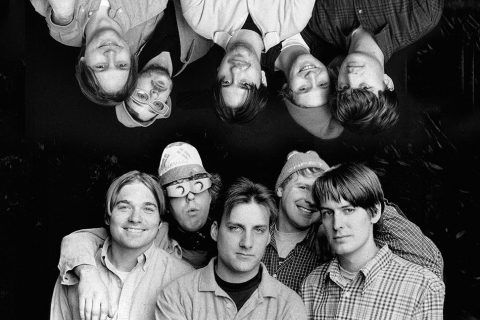With the world premiere of Pavements (2024), critic’s darling Alex Ross Perry has his own Steve Jobs moment.
In the by-now historic keynote that revealed the first-ever iPhone in January 2007, the Apple founder sparked ecstasy by announcing, “One more thing: An iPod. A phone. And an Internet communicator.” Perhaps it would seem funny to Alex Ross Perry to see his equally silly and endearing tribute to 90s indie rock band Pavement inadvertently compared to the momentous spectacle summoned by the Cupertino tech giant. Had there been a keynote of similar fashion for the promotion of his newest (and first) docu-fiction, Perry may have deliberated his very own triad: “A biopic! A musical! And a gallery exhibition!”
Following the acclaimed Her Smell in 2018, the Pennsylvania native found himself increasingly interested in exploring how far he could stretch the well-trodden path of cinematic biopics, a genre that all too often takes on the form of faithful (when convenient) and imitative (where deemed appropriate) commemoration.
Approached by the band’s home label Matador Record to develop a script, Perry, as with the experimental concert film GHOST: Rite Here Rite Now (2024) — co-directed with Tobias Forge — opted for something to burst the limits of the genre rather than cementing them. Soon, he found himself amidst research for a pop-up museum exhibition in Lower Manhattan’s Tribeca, the writing, casting and rehearsal process of a live musical, and realising a biopic based on a 50-page-spanning script. The latter, shot on the short ends of Her Smell, inevitably channels Jake Kasdan’s Walk Hard: The Dewey Cocks Story (2007), with the recurring graphic watermark of the Academy’s Digital Screening Room suggesting just the right amount of facetiousness toward annually manufactured and autumnally released Oscar-bait cinema.
The three projects, in one way or another, were all realised in 2022. Pavements proves as much a testament to Perry’s infatuation with Pavement as to his delight in the creation, gathering and manipulation of material. However, while Perry not only prepared the multi-day exhibition in Tribeca (much more through cinematic set design than through museological curation) but also wrote and directed the stage musical and rock biopic, respectively, Pavements marks an unprecedented departure from full creative control, often with more cameras filming than he could oversee. It certainly testifies to the close collaboration with editor and Pavement aficionado Robert Greene and cinematographer Robert Kolodny, both filmmakers in their own respect.
In a filmography defined not so much by plot as by parceled-out slice-of-life structures, Pavements, more than anything else, assumes a new kind of looseness. Oscillating between faux and real found-footage, informed (and often funny) satire, and, weirdly enough, self-deprecating overindulgence, Perry intercuts archival material (mostly retrieved from band lead Stephen Malkmus’ own inventory) with before and behind-the-scenes footage of his own staging.
There certainly is an audience for that. In light of the band’s latest renaissance, the main constituent being exclusively Pavement fans doesn’t seem to be too bad of a proposal.
Propelled by the mysterious and obscure Spotify and Tik-Tok algorithms, “Harness Your Hopes,” a song that for almost 20 years barely managed to subsist on a 1999 B-side, retroactively became a career-defining anthem while still — perhaps more than ever — emanating a nonsensical yet deep-felt sincerity. This might be the kind of tonal sweet spot Perry was after.

Patrick Fey is a freelance critic, whose writing has appeared on Kino-Zeit, Critic.de, Filmstarts and Moviebreak.




